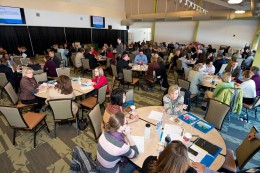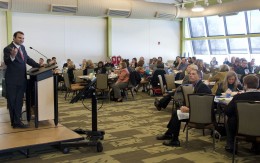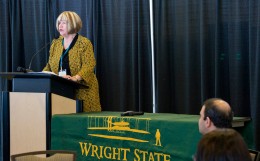
Participants broke into small groups to discuss recruiting health care professionals to the region during the Regional Summit.
Battle plans to combat obesity, drug abuse, mental disabilities and other health concerns in rural communities were outlined at this year’s Lake Campus Regional Summit.
About 150 school, government, health care and Wright State University officials attended the Feb. 28 summit, titled “For the Health of It,” at James F. Dicke Hall on the Lake Campus in Celina.
The summit, hosted by Lake Campus Dean Bonnie Mathies, included a presentation on the Wright Rural Health Initiative by John Pascoe, M.D., director of the General/Community Pediatrics Department of Pediatrics at Dayton Children’s Hospital; and a presentation by Therese Zink, M.D., Wright State professor and director of the Global Family Medicine Pathway.
Lisa Klenke, CEO of Mercer Health, and Dale Palmer, administrator of Mercer Health/Mercer County Health Department, presented the findings of a local public health assessment and a two-year improvement plan; and a behavior-based health project in Auglaize County was presented by Robert Gill, M.D., of Grand Lake Health Systems.
Roundtable discussions included topics such as how to recruit health care professionals to the region.
Kimberly Barrett, Ph.D., vice president for multicultural affairs and community engagement at Wright State, discussed the need to provide educational access for the poor and disabled. And she said community engagement is key to the social, political and economic health of the region.
Barrett noted that the Lake Campus’ Garden of Life provides fresh produce to local food pantries for those in need.
“We need community partners like you not only as collaborators for important projects, but to make the case to your colleagues and neighbors and to your elected officials that public higher education is a public good,” Barrett said.

Wright State Provost S. Narayanan discussed the changing landscape of higher education and applauded the Lake Campus for initiatives such as its new degree programs in mechanical engineering and food science.
Wright State Provost S. Narayanan discussed the changing landscape of higher education that features declining state financial support, the growth of distance learning, pressure to commercialize research and expanding global outreach. He detailed how Wright State is striking a balance between teaching, research, community service and economic impact.
Narayanan applauded the Lake Campus for initiatives such as developing degree programs in mechanical engineering and food science and for broadening its study-abroad experiences. He also praised the Western Ohio Educational Foundation for generating $3 million in scholarships.
“I’m very, very excited by all of these things that are going on,” Narayanan said. “I truly believe our best is yet to come, and we can get there by embracing change and creating value for our students, our region and our nation.”


 Walking through open doors
Walking through open doors  Adventures await
Adventures await  Wright State to expand nursing facilities to meet workforce needs and prepare more graduates for in-demand careers
Wright State to expand nursing facilities to meet workforce needs and prepare more graduates for in-demand careers  Wright State student-athletes make a lasting impact on local family with more to come
Wright State student-athletes make a lasting impact on local family with more to come  Wright State names Rajneesh Suri dean of Raj Soin College of Business
Wright State names Rajneesh Suri dean of Raj Soin College of Business 